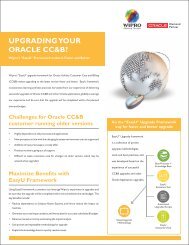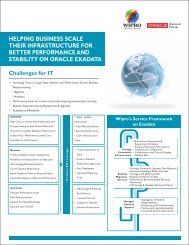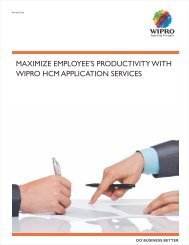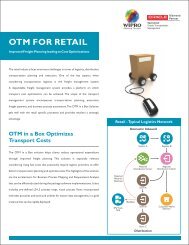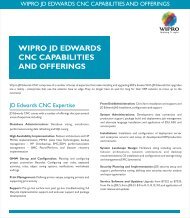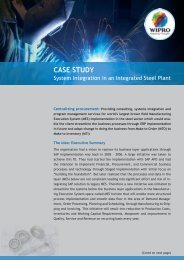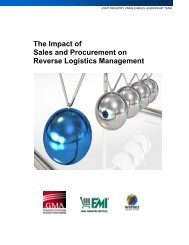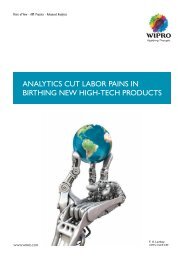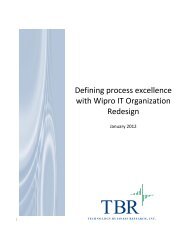Knowledge Management Strategies for Mitigating the Big Crew - Wipro
Knowledge Management Strategies for Mitigating the Big Crew - Wipro
Knowledge Management Strategies for Mitigating the Big Crew - Wipro
You also want an ePaper? Increase the reach of your titles
YUMPU automatically turns print PDFs into web optimized ePapers that Google loves.
<strong>Knowledge</strong> <strong>Management</strong> <strong>Strategies</strong> <strong>for</strong> mitigating <strong>the</strong> <strong>Big</strong> <strong>Crew</strong> Change in E&P<br />
To demonstrate <strong>the</strong> effectiveness of <strong>the</strong> tool, a secondary objective of analyzing <strong>the</strong> Pennsylvanian play of sou<strong>the</strong>ast New<br />
Mexico will be per<strong>for</strong>med. Public data will be organized <strong>for</strong> analyzing this outstanding, bypassed-pay play, which will provide an<br />
example of <strong>the</strong> usage of <strong>the</strong> system while simultaneously providing a significant opportunity <strong>for</strong> identifying new reserves.”<br />
Oil and gas companies need to do advance <strong>for</strong>ecasting within <strong>the</strong>ir organization to understand what non-replaceable, critical<br />
personnel will be lost during <strong>the</strong> <strong>Big</strong> <strong>Crew</strong> Change and work with <strong>the</strong>se employees to transfer <strong>the</strong>ir unique knowledge to <strong>the</strong>se<br />
expert systems. Because of <strong>the</strong> high cost of <strong>the</strong>se systems, oil and gas companies should consider <strong>for</strong>ming partnerships with<br />
similar firms and seek government funding.<br />
As companies struggle to offset <strong>the</strong> 6% attrition rate with new employees, <strong>the</strong>y will need new ways to reduce time to<br />
productivity; that is, <strong>the</strong> amount of time it takes <strong>for</strong> <strong>the</strong> company to break even on <strong>the</strong>ir investment in recruiting and training<br />
new employees. In recent SPE paper, “Developing Young Exploration and Production Professionals to Solve <strong>the</strong> ‘<strong>Big</strong> <strong>Crew</strong><br />
Change’”16, employee development is defined as:<br />
• 10% <strong>the</strong>ory<br />
• 50% On-Job-Training<br />
• 40% Coaching and Mentoring<br />
As fewer and fewer coaches and mentors are available, companies are going to have to rely more heavily on knowledge<br />
managements systems. As covered earlier in this section, current employees and alumni will need incentives to contribute to <strong>the</strong><br />
knowledge base to provide <strong>the</strong> support infrastructure to <strong>the</strong> incoming work<strong>for</strong>ce.<br />
The knowledge community and its communications infrastructure will help address <strong>the</strong> issue of having a work<strong>for</strong>ce located in<br />
Asia to per<strong>for</strong>m work in North America and <strong>the</strong> Middle East. As discussed earlier in this section, Shell has developed a COE in<br />
Bangalore, India to provide support operations worldwide. As it becomes more and more impractical to relocate engineers from<br />
<strong>the</strong>ir home countries in Asia, <strong>the</strong> COEs will need to trans<strong>for</strong>m support centers to operations centers. New technologies in unified<br />
communications, digital oilfields, and SCADA systems will make it possible to do more and more work remotely. Unified<br />
communications will increase <strong>the</strong> effectiveness of virtual teams making it possible <strong>for</strong> a large team in Bangalore to support a<br />
skeleton crew on <strong>the</strong> ground in Alaska. SCADA systems will allow <strong>the</strong> control center in Bangalore to monitor equipment, receive<br />
alerts, and make adjustments to production plat<strong>for</strong>ms in <strong>the</strong> Gulf of Mexico, reducing <strong>the</strong> number of employees needed on site.<br />
Condition based maintenance systems based in Bangalore will make it possible to extend physical maintenance intervals in<br />
oilfields in <strong>the</strong> Texas panhandle. This will reduce <strong>the</strong> number of technical support teams driving around <strong>the</strong> prairie in trucks<br />
maintaining equipment.<br />
[15] [16]<br />
The technology needed <strong>for</strong> this solution exists today. <strong>Wipro</strong> is building it on <strong>the</strong> Microsoft plat<strong>for</strong>m.<br />
11 | www.wipro.com/industryresearch<br />
WIPRO TECHNOLOGIES




